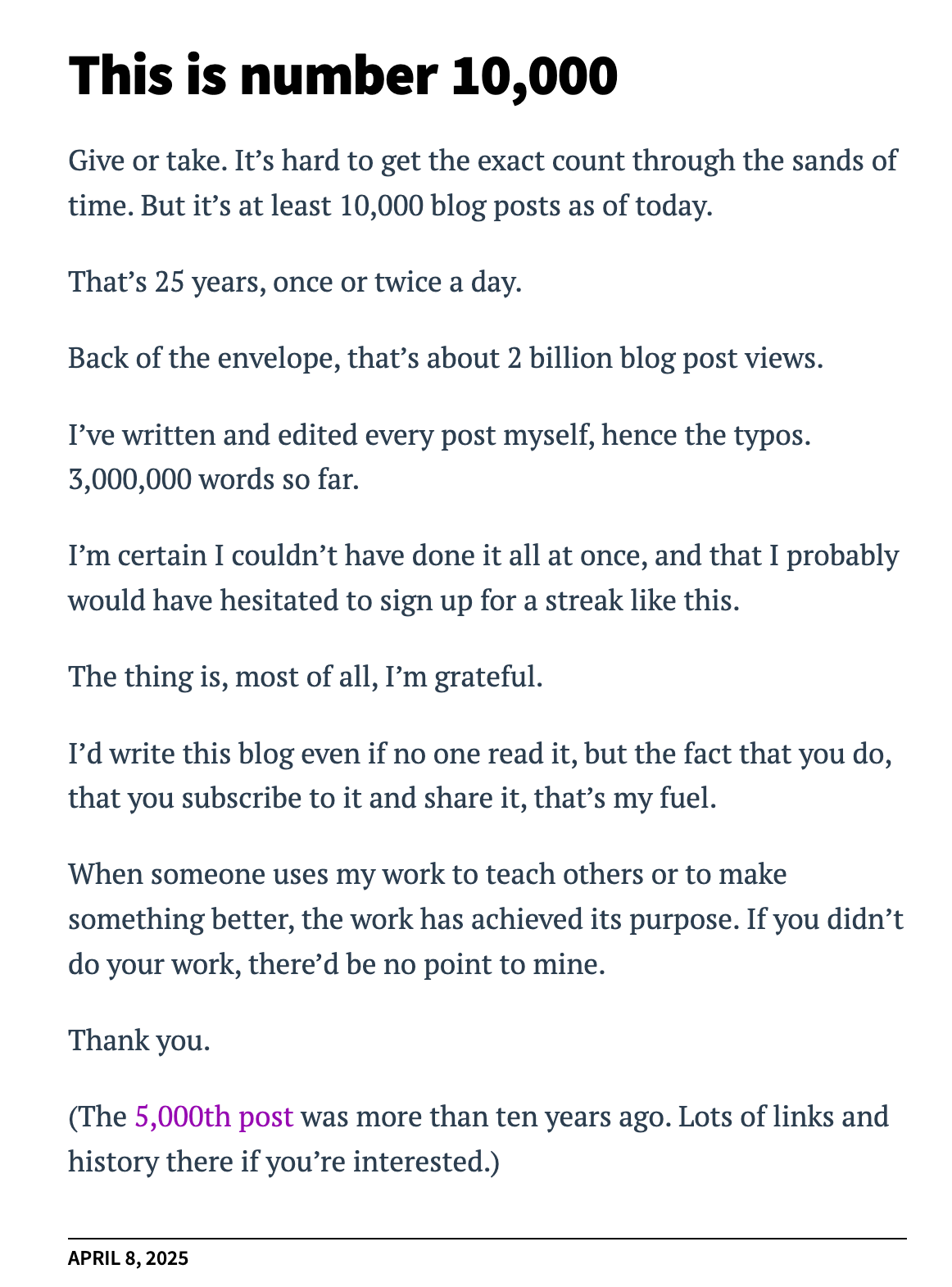Seth Godin and how to show up every day.
Failing is one of the greatest arts in the world. One fails toward success.
Seth Godin isn’t a celebrity or a movie star. He’s not the loudest voice in the room, and he doesn’t go viral for outrageous tweets or flashy videos. But if you’ve ever tried to create something, to make art, to start a business, or to speak your truth, there’s a good chance his words have found you. Quietly, patiently, like a friend tapping you on the shoulder.
Seth is a writer, a teacher, and a thinker. He’s written over twenty books, most of them about marketing, leadership, and the way ideas spread. But not the kind of marketing that tricks people he talks about marketing that matters, the kind that builds trust and helps people see the world differently.
He’s also done something most people wouldn’t even dare to start: he’s written a blog post every single day for over 25 years. That’s more than 10,000 posts. No assistants, no ghostwriters, just him, typing something real every day.
It’s not the number that’s impressive, though it’s huge. It’s the fact that he kept going. Not once a week. Not when he felt like it. Every single day.
When he began his blog in 1999, there was no Twitter to drive traffic and no Instagram algorithm to game. Blogs were not the cultural staples they are now; they were experiments, digital diaries scattered across the nascent web. Email newsletters, too, were curiosities at best.
Godin wasn’t chasing a trend; he was inventing his lane.
While the rest of the marketing world was still shouting through TV screens and billboards, Godin was whispering into inboxes, inviting people into a quieter, more thoughtful conversation.
His writing is not flashy. Rarely does it stretch beyond a few hundred words. Often, it’s just a nudge, a provocation, a small truth rendered visible. But it’s the smallness, the digestibility, that makes it potent. You can read it in under two minutes yet feel the ripple hours later. It’s the kind of writing that doesn’t try to impress; it tries to connect.
Let’s imagine it. You wake up, you pour a cup of coffee, and you sit down to write. Some days the words come easily. Other days, they don’t. Some posts will be read by thousands. Others, maybe just a few. Some will feel great. Others will feel flat. But you write anyway.
Because that’s what you do. You show up.
That’s Seth.
He said that he would write the blog even if no one read it. But people do read it. Millions have, over the years. Not because it’s loud or polished or perfect but because it’s honest. Because it keeps showing up.
That kind of daily practice does something. It builds trust with readers, yes, but even more with yourself. It tells your brain, This is who I am now. I’m a person who keeps going.
It’s like brushing your teeth. You don’t do it because you’re trying to win an award for clean teeth. You do it because it’s a habit. Because it keeps you healthy.
Writing, creating, and making things—it’s the same. You don’t do it just for the big days or the applause. You do it because it’s your practice. And over time, that practice shapes you.
Seth doesn’t write long posts. Some are just a few lines. A quick idea, a question, a small reflection. But they carry weight. Because they come from a place of doing the work, day in and day out. He doesn’t wait for the perfect moment or the perfect mood. He just starts typing.
That’s how you get better at anything. Not by waiting for the perfect idea. But by showing up when you don’t have one.
Seth’s career is full of smart ideas, bestselling books, and groundbreaking insights. But underneath it all is something even more powerful: a decision to keep showing up. He is wealthy and famous enough that doing it every day is not a need. Yet, he does it. I am at over 400 posts with this newsletter.
What I have learnt from Seth is that it’s not about being the best right away. It’s about starting. And starting again. That’s how you build a body of work. That’s how you earn trust. That’s how you change things.
Not with a single heroic effort but with small, consistent steps.
Maybe the lesson you can take from Seth Godin is what I have taken and have tried to emulate for years, and that is you can keep going.
Even when it’s boring.
Even when no one notices.
Even when it’s hard.
Over time, consistency becomes credibility. Credibility becomes impact.
When you think of starting something and wonder if it’s worth starting something or whether your small efforts matter, think of Seth Godin. Think of the man who sat down to write a short blog post not once, not twice, but every day for almost 3 decades and then, maybe, sit down to do your work too.





